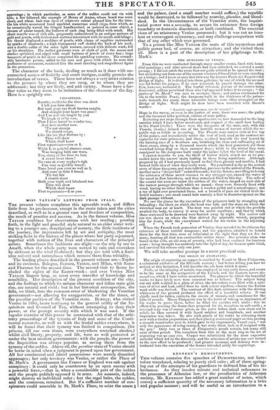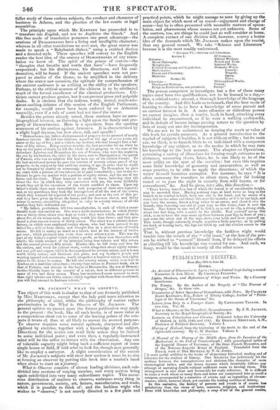KENNEDY'S DEMOSTHENES.
THIS volume contains five speeches of DEMOSTHENES, not here- tofore translated, relating to purely civil suits ; all of them spring- ing out of the attempts of his guardians to defraud him of his in- heritance. As they involve minute and technical references to the processes of Athenian law, or the peculiarities of Athenian society, Mr. KENNEDY has added a great number of notes, which convey a sufficient quantity of the necessary information in a brier and popular manner; and will be useful as an introduction to a
fuller study of these curious subjects, the conduct and character of business in Athens, and the practice of the law courts or legal assemblies.
The principle upon which Mr. KENNEDY has proceeded is to " translate into English, and not to Anglicize the Greek." And this free mode of translation possesses one great advantage—the orations of DEMOSTHENES have a living and intelligible character; whereas in all other translations we ever met, the great orator was made to speak a " Babylonish dialect," using a crabbed diction and a fettered style. These speeches will convey to the English reader the best idea of the oratory of DEMOSTHENES of any trans- lation we know of. The spirit of the prince of orators—the "thoughts that breathe and words that burn"—have frequently evaporated ; but his distinctness, his directness, and his con- densation, will be found. If the ancient speeches were not pre- pared as studies of the theme, to be amplified in the delivery where the orator saw occasion, the aptitude for comprehension of the ancient audiences is as striking as the ability of the speakers. Perhaps, to the critical acumen of the citizens is to be attributed much of the formal excellence of the classical productions. Cri- ticism cannot produce genius, but it can prevent gross and palpable faults. It is obvious that the tedious, wordy, unreal, much-ado- about-nothing debates of this session of the English Parliament, for example, would never have been endured by an Athenian assembly, even if a rule of court had not timed the orator.
Besides the points already noted, these orations have an auto- biographical interest, as throwing a light upon the family and pro- perty of DEMOSTHENES. Here is a specimen, from the opening statement of his oration against APHOBUS. It is characterized by a slight legal dryness, but how close, full, and specific ! " Demosthenes, my father, died possessed of property to the amount of nearly fourteen talents. He left two children, myself at the age of seven years, my sister at the age of five ; and a widow, my mother, who had brought him a for- tune of fifty minas. Being anxious to make the best provision for us, when he was on the point of death, Being left the hole of his property to the care of the defendant Aphobus and Demophon the son of Demon, who were his nephews, the one by his brother, the other by his sister, and to Therippides of the parish of Pmania, who was no relation but had been one of his earliest friends. To the last-mentioned person he gave the interest of seventy minas, parcel of my property, to be enjoyed by him until my coming of age, in order that he might not be tempted by avarice to mismanage my affairs. To Demophon he gave my sister with a portion of two talents, to he paid immediately ; and to the de- fendant he gave my mother with a portion of eighty minas, and the use of my house and furniture. These bequests he made to them, believing that the closer the ties by which they were connected with me, the more faithfully would they act in the execution of the trusts confided to them. Upon my father's death, these men immediately took possession of their own legacies; and, as my guardians, they took the management of all the rest of the estate, which they retained for a period of ten years ; and now at the end of this pe- riod they have given up to me the house, and the fourteen slaves, and thirty minas in money, amounting altogether in value to seventy minas; of all the
residue they have defrauded me. • •
" My father, gentlemen, left two manufactories, in each of which a consi- derable trade was carried on. One was a knife-manufactory, in which thirty- two or thirty-three slaves were kept at work : they were worth, most of them, about five or six minas each, none being worth less than three; and they pro- duced a clear annual income of thirty minas. The other was a cabinet-manu- factory, in which were employed twenty slaves, who had been pawned to my father for a debt of forty minas, and brought him in a clear income of twelve minas. He left in money as much as a talent, lent at the interest of twelve per cent., which produced him more than seven minas a year. This was the part of my father's capital which yielded a profit, as these men themselves will admit; the whole amount of the principal being four talents and fifty minas, and the annual proceeds fifty minas. Besides this, he left ivory and iron for the cutlers, and wood for cabinet-work, worth altogether about eighty minas; and nut-gall and copper, which he had purchased for seventy minas, and a house worth thirty minas; and furniture and plate, and my mother's jewels and wearing apparel and ornaments, worth altogether a hundred minas, and eighty minas in the house in money. He left also seventy minas, which were lent to Xuthus on a maritime adventure; twenty-four minas in Pasion's bank, six in that of Pylades, and sixteen in the hands of Demomeles, the son of Demon ; besides friendly loans to the amount of a talent, lent to different persons in SUMS of two and three minas. These last-mentioned sums amount to more than eight talents and thirty minas; which together with those first mentioned, you will find amount to fourteen talents."



























 Previous page
Previous page